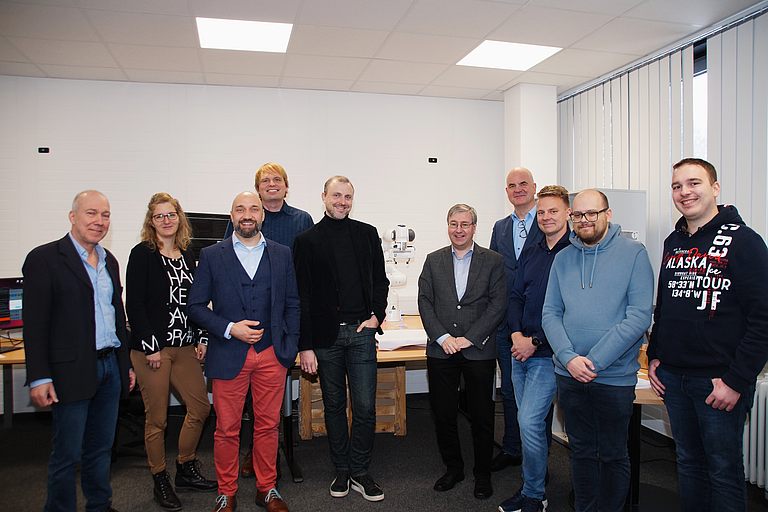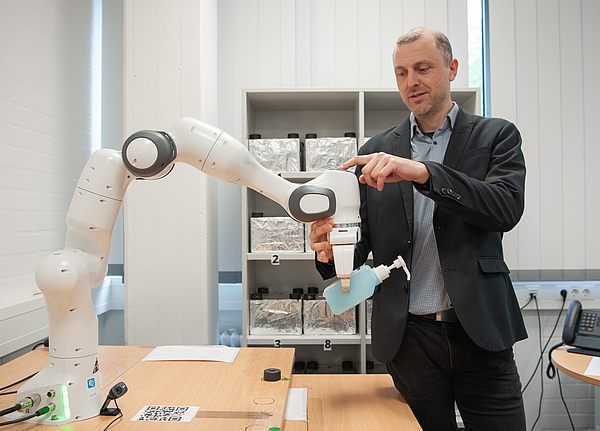Sustainable human-AI collaboration
The “Sustainable Human-AI Collaboration” science area jointly applied for by Clausthal University of Technology, Göttingen University, Göttingen University Medical Center and HAWK Göttingen has set itself the goal of making robots fit for use as care assistants.
The project is dedicated to a particularly socially relevant issue. “Germany is ageing. Due to increasing life expectancy, the need for outpatient care and rehabilitation is constantly growing. At the same time, there is a shortage of skilled workers who can provide the corresponding care, therapy and healthcare services. In the project, we want to create the basis for closing this gap,” explains Prof. Andreas Reinhardt, who is coordinating the research project on behalf of the Clausthal Institute of Computer Science. According to forecasts by the German Economic Institute, this supply gap will continue to grow; a deficit of almost 500,000 nursing staff is predicted for 2035.
This is where digitalization offers an opportunity to mitigate the shortage of skilled workers: through the use of assistance technologies and human-AI collaboration. According to Reinhardt, however, a number of fundamental research questions still need to be answered in order to fully exploit this potential. For example: How must an AI system be structured in order to be able to collaborate with humans in a sustainable, resource-saving, efficient and safe way? Which sensors and AI processes are required to recognize and predict human moods, intentions and actions? How can we adhere to ethical principles and better protect the privacy of those involved? And what impact does this protection have on the trust and acceptance of those involved in the patient-caregiver-robot interaction triangle?
The 14 professors and their teams involved in the project will be investigating these and other questions over the next five years. The project will be funded with 3 million euros during this time. The project builds seamlessly on the research expertise gained from the KEIKO project and the predecessor project HerMes in the field of human-machine collaboration at the SWZ.
Participating scientists
- Prof. Dr. Claire Chalopin (Ingenieurwissenschaften und Gesundheit, HAWK Göttingen)
- Prof. Dr. Rüdiger Ehlers (Software and Systems Engineering, TU Clausthal)
- Prof. Dr. Thomas Linkugel (Ingenieurwissenschaften und Gesundheit, HAWK Göttingen)
- Prof. Dr. Jörg P. Müller (Informatik, TU Clausthal)
- Prof. Dr. Andreas Rausch (Software and Systems Engineering, TU Clausthal)
- Prof. Dr.-Ing. Andreas Reinhardt (Informatik, TU Clausthal)
- Prof. Dr.-Ing. Delphine Reinhardt (Informatik, Universität Göttingen)
- Prof. Dr. Anne Schacht (Psychologie, Universität Göttingen)
- Prof. Dr. Silke Schicktanz (Ethik und Geschichte der Medizin, Universität Göttingen)
- Prof. Dr. Wolfgang Viöl (Ingenieurwissenschaften und Gesundheit, HAWK Göttingen)
- Prof. Dipl.-Des. (FH) Stefan Wölwer (Gestaltung von interaktiven Medien, HAWK Göttingen)
- Prof. Dr. Uwe Wolfram (Werkstoffkunde und Werkstofftechnik, TU Clausthal)
- Prof. Dr. Ramin Yahyapour (Informatik, Universität Göttingen)


